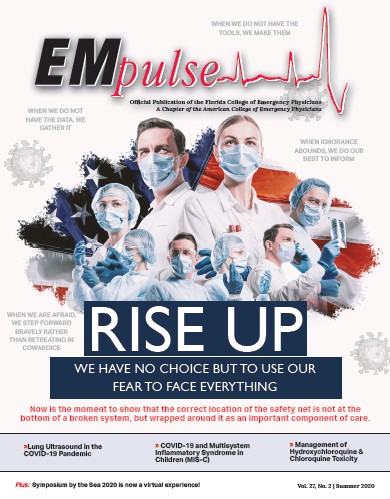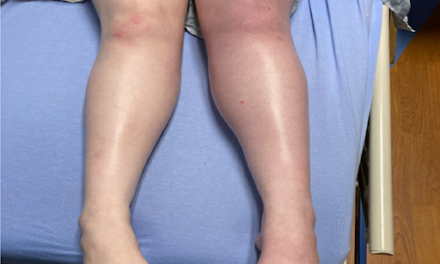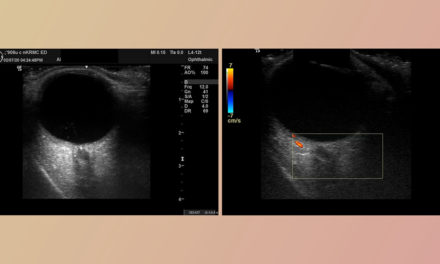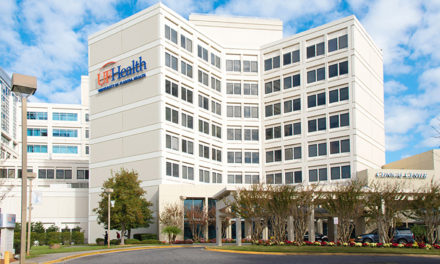Summer 2020: EMS/Trauma
Our world has changed. We are limited by where we can go, who we can see, and the normal everyday tasks that allow us to feel healthy and whole are gone. Not only do we have to wear uncomfortable protective equipment at work, but also we have to wear masks at the gym, grocery store, and everywhere else. This pandemic has left us feeling on-guard since the beginning of this year. The virus started with claiming our freedom, then our economy, all while attacking our friends and family along the way. The spectrum of illness is so variable, ranging from asymptomatic to death, which allows for it to spread through the masses silently. We have an expansive knowledge of emergency conditions from trauma, STEMI, stroke and sepsis, but we have to consider each case as a possible COVID presentation. We have no choice but to use our fear to face everything and rise up: FEAR. When you feel angry, use your energy to fight this disease and the pandemic. Do not allow your anger to take away your compassion for your colleagues and patients.
Amidst this worldwide pandemic, another ugly aspect of our culture has again come to light: the presence of racism. As first responders and caretakers of our citizens, we must remember to be vigilant and stay anti-racist. We must be aware of any implicit bias (unconscious bias), which Uche Blackstock, MD defined in an ACEP 2019 column as “a person’s tendency to associate a group or category attribute, such as being black, with a negative evaluation.” People across our society, including ourselves, hold such unconscious biases. We have seen firsthand how these biases affect the criminal justice system. Unfortunately, these are also present in the healthcare system. They exist as feelings towards our patients, which have been present since the beginning of our professional lives. This can affect the way we treat patients. There is clear evidence that both in the emergency department and in the prehospital setting, potential disparities exist in the way we provide care to our patients.
For example, differences amongst transport destinations, as well as the frequency of pain medication administration when comparing different races, raise concerns that bias is altering care. We must recognize that these biases are present and actively fight them. This can occur by educating ourselves and our medical colleagues, from paramedics, EMTs, nurses and physicians. Another action would be to create a workforce that is representative of the population it serves. This is a recommendation from the National Association of EMS educators based on an article from ACEPNow in June 2020. The expression Black Lives Matter is as pertinent to healthcare as it is in law enforcement. As healthcare providers, we already recognize that all lives matter, but until we include black lives equally as part of that commitment, we will continue to fall short in our duty.
FAEMSMD had its last meeting March 4, 2020 in Tampa, FL. At this meeting, members discussed ideas on how to enhance the services the organization provides and how to increase the value of membership. Some of their ideas included CME lectures and education, real-time legislative updates, mentorship programs, a newsletter with announcements, education programs, webinars and industry updates. We also held elections on July 8, 2020 via webinar. Please see the new officers list on the Table of Contents page 6.
There were several presentations during FAEMSMD’s recent meeting. The first was from Dr. Alicia Buck, who reviewed the “EPIC trial: Excellence in Prehospital Care.” We discussed their recommendations for traumatic brain injury treatment, including an algorithmic approach to decrease intubation in the field and strive to maintain normal vital signs to try and improve overall outcomes in this patient population. Dr. Alison Leung reviewed the article, “TXA: the future of stop the bleed.” Dr. Leung attributed the inconsistent adherence to the administration of TXA in the field with the inconclusive data available surrounding its use in the field. She did discuss that the data does seem to support the safety of administration in certain populations. Dr. Desmond Fitzpatrick led the discussion regarding ECPR and ECMO. Dr. Fitzpatrick, AdventHealth and Lake County EMS have initiated a program that will allow ECMO to be utilized on specific patients, which are identified by EMS, followed by ECMO initiation in the ICU in the Lake County region.
Dr. John Mcpherson and our Region V trauma agency continue striving to create gold standard trauma EMS protocols that will streamline our treatment of trauma patients.
We would also like to welcome our new EMS fellows: Monty Putman, MD with Orange County and Orlando Health; Alicia Nassar, MD with Tampa Fire Rescue and Pinellas County EMS; Austin Reed, MD; and Dr. Bethany Johnston with UF Health. ■
This article is part of the following sections:








